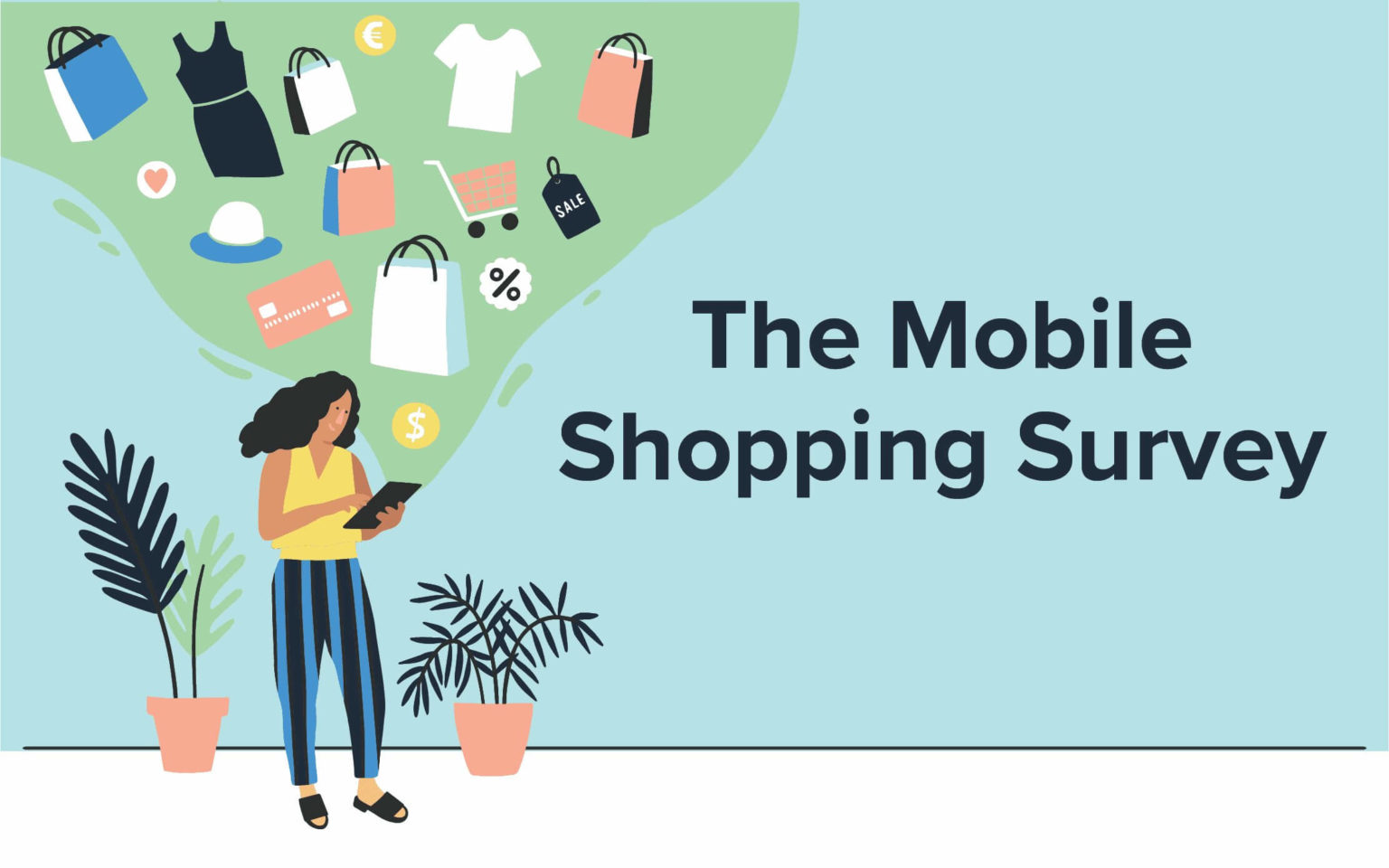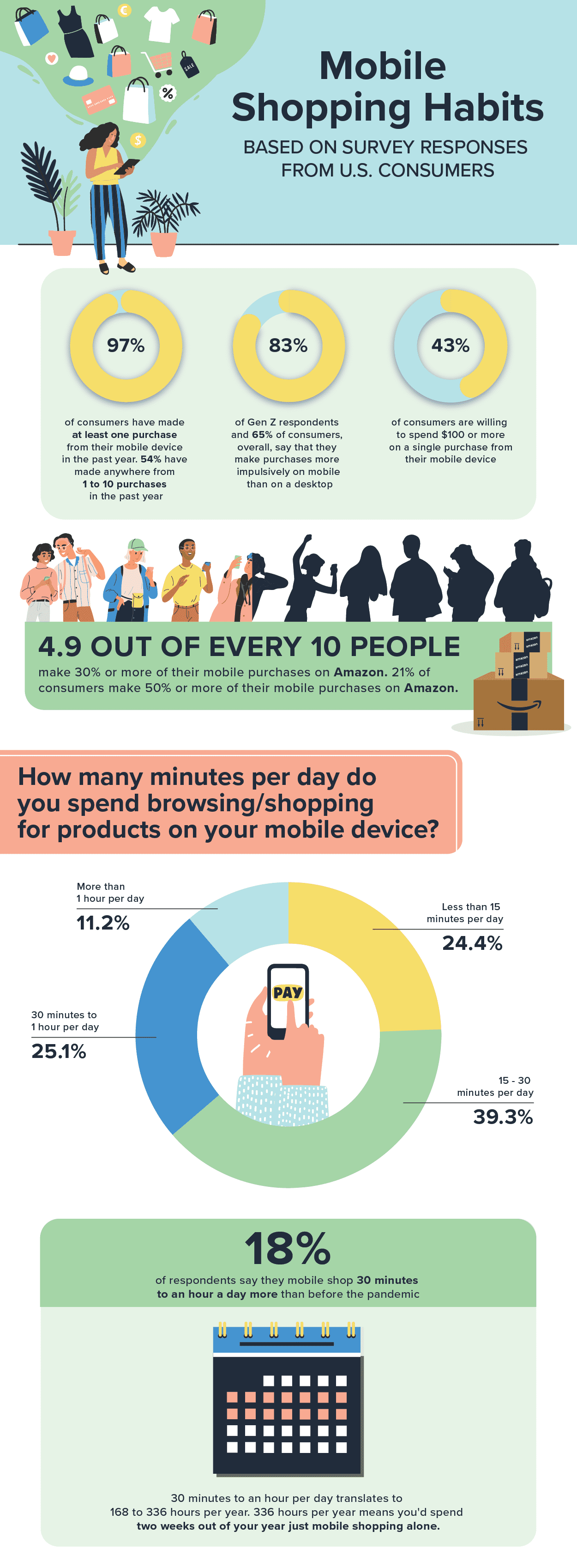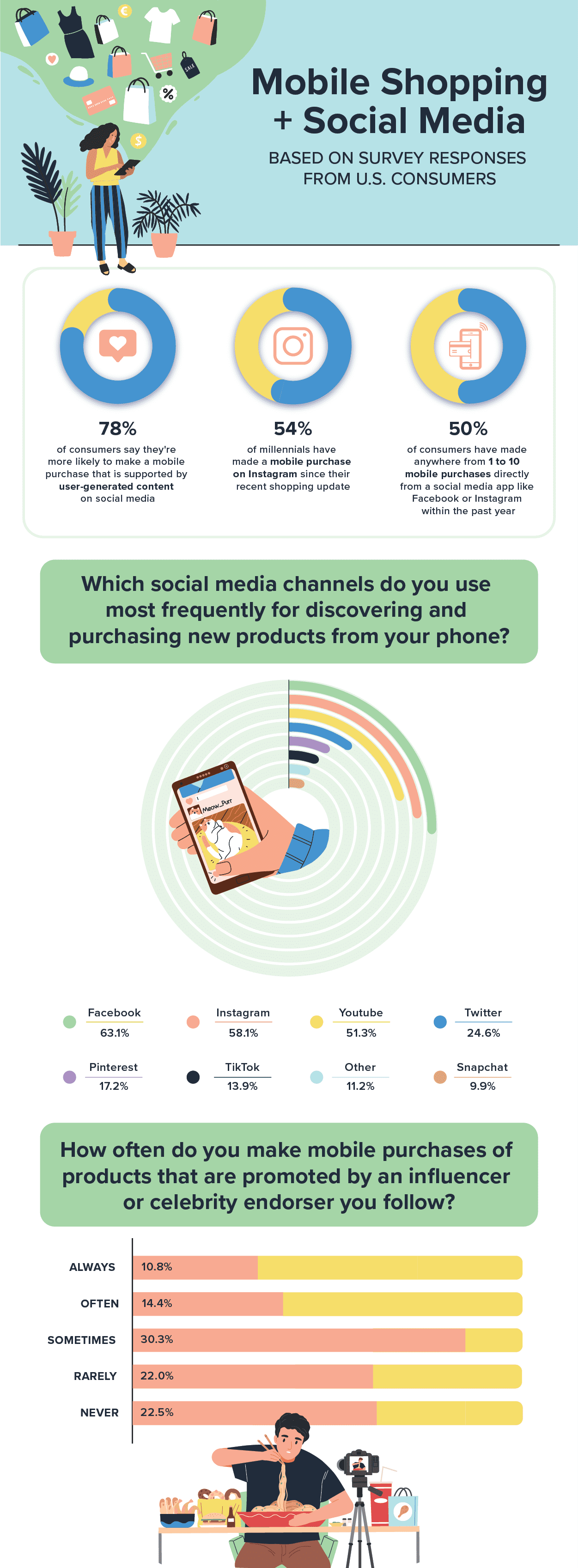The Mobile Shopping Survey
We surveyed nearly 1,000 Americans to learn how often they shop on their smartphones. Learn their mobile shopping habits, their preferred mobile shopping channels, and more!

We surveyed nearly 1,000 Americans to learn how often they shop on their smartphones. Learn their mobile shopping habits, their preferred mobile shopping channels, and more!

It’s official – it’s a mobile world and we’re all just living in it! Mobile commerce is growing by the day. According to Oberlo, almost three out of every four dollars spent on online purchases today is conducted through a mobile device. Business Insider Intelligence predicts that mobile commerce will comprise 44% of the total U.S. e-commerce market by 2024.
Smartphones have certainly been the muscle behind mobile commerce growth, but buy buttons like Amazon Pay & Google Pay have also made mobile shopping alarmingly simple – providing fast and secure mobile checkout at the click of a button. Social media platforms have also followed suit. Instagram notoriously swapped out their activity tab with a shop tab in order to better connect consumers with the brands they love on mobile.
With a tidal wave of mobile shopping growth, the question was posed: what percentage of the average consumer’s purchases are made on mobile in 2021? To find out, SimpleTexting went straight to the source, surveying nearly 1,000 consumers around the U.S. to gauge:
Read on to see the full results!

In order to determine how pervasive mobile shopping is for the average consumer, we asked respondents about their mobile shopping habits over the past year and how much time they spend shopping for (or browsing) products on their smartphones.
We found that 97% of consumers have made at least one purchase from their mobile device in the past year, while 54% of consumers have made anywhere from one to ten mobile purchases in the past year. A quarter of Gen X consumers have even made 21 or more purchases from their device during that same time frame, according to survey responses.
Over one-third of consumers (36%) say they make 20 – 40% of their overall purchases from a mobile device. What’s more, mobile purchases are being made more frequently due to the impulsive nature of shopping from your smartphone. Factors like “one-click buying” and easy price comparisons on mobile could be the driving force behind trigger-happy purchases. 83% of Gen Z consumers and 65% of consumers overall say they make purchases much more impulsively on mobile than desktop.
So where does Amazon factor in? According to survey responses, they make up a substantial share of consumers’ overall mobile purchases. Almost half of consumers make 30% or more of their mobile purchases on Amazon, while 21% make 50% or more of their mobile purchases on Amazon.
With soaring screen time rates during COVID-19, we also wanted to track the average time spent shopping on a mobile device currently versus before the pandemic. We found that 18% of respondents say they mobile shop 30 minutes to an hour per day more than before the pandemic, and 28% of respondents say they mobile shop over an hour per day more. When you crunch the numbers, an additional hour per day means you’d spend two weeks out of your year just mobile shopping alone.

In light of increased at-home time, fewer outings, and most major events canceled, consumer spending has certainly shifted over the last year. Survey responses showed that mobile purchases of clothing, electronics, and ticket purchases have decreased as a result of the pandemic, while mobile purchases of categories like groceries, health & wellness products, furniture, and games have increased.

Next, we wanted to take a look at other channels for mobile shopping. Social shopping and creative, digital merchandising strategies have played an enormous role in mobile commerce growth in the past few years. Almost 70% of consumers have made at least one mobile purchase directly from a social media app like Facebook or Instagram within the past year. Half of consumers have made anywhere from one to ten purchases directly from a social media app in that same time frame. Further, 54% of millennials have made a mobile purchase on Instagram, specifically, since their November 2020 interface update.
Which is the social channel of choice for mobile shopping? When asked which social media channel is the go-to for discovering and purchasing new products from a mobile device, the majority of consumers (63%) say Facebook, followed by Instagram (58%), and Youtube (51%).
Additionally, we wanted to uncover which social media marketing strategies led to the most mobile purchases by the average consumer. 78% of consumers say they’re more likely to make a mobile purchase of a product/service that is supported by user-generated content (i.e., a post, video, or story from a fellow user of a social media platform). Often brands will promote UGC content across their own marketing channels to foster a culture of transparency and authenticity.
Influencer marketing and celebrity endorsements didn’t fare as well according to survey responses. When asked how often they make mobile purchases that are promoted by influencers or celebrities, 30% of consumers say sometimes and 45% say either rarely or never. This could be due to the fact that user-generated content is organic in nature, while influencer content is typically sponsored by a brand.

Lastly, we took a look at how text message marketing can lead to mobile purchases as well as important factors that impact Americans’ willingness to make a purchase from their mobile device. When asking consumers which factor would most encourage them to make a mobile purchase, an upgraded customer experience was the answer. The largest portion of respondents (31%) say flexibility (customers can make purchases on the go), followed by convenience (purchases can be made directly through social media platforms) (28%), and faster checkout options (24%).
In terms of factors that would most prevent consumers from making a mobile purchase, the largest portion of respondents overall (44%) and 66% of baby boomers say security threats such as hacking or data theft would be the biggest concern.
Finally, text marketing is a proven (and cost-efficient) method for driving mobile sales, providing customer service, and encouraging customer loyalty. According to survey responses, 86% of consumers are signed up to receive promotional text messages from at least one brand, while 65% are signed up for messages from anywhere between one and four brands. What’s more, almost two-thirds of consumers say they’re most likely to sign up for a brand’s text messages in order to receive exclusive promotions like coupons or special offers. Other prime use cases include receiving product updates (35%) and sale notifications (35%).
With mobile commerce growth comes stiff competition in the space and additional barriers for brands to effectively reach their customers. Get started with our ultimate guide to SMS marketing and a 14-day free trial of SimpleTexting to get in front of your audience where they already are – ahem..on their smartphones.
Drew Wilkinson is the Head of Marketing at SimpleTexting. Drew has more than a decade of experience managing successful integrated marketing programs to build brands, raise awareness, and generate demand.
More Posts from Drew WilkinsonWhisker Seeker Tackle spotted a glaring gap in the market and turned it into a thriving e-commerce and wholesale business. Learn how entrepreneur Matt Davis leverages SMS text marketing services to drive sales.
ReadAs traditional retailers continue to struggle and e-commerce accelerates, live stream shopping will change how we discover and buy products.
ReadStart a text marketing campaign or have a 1-on-1 conversation today. It's risk free. Sign up for a free 14-day trial today to see SimpleTexting in action.
No credit card required